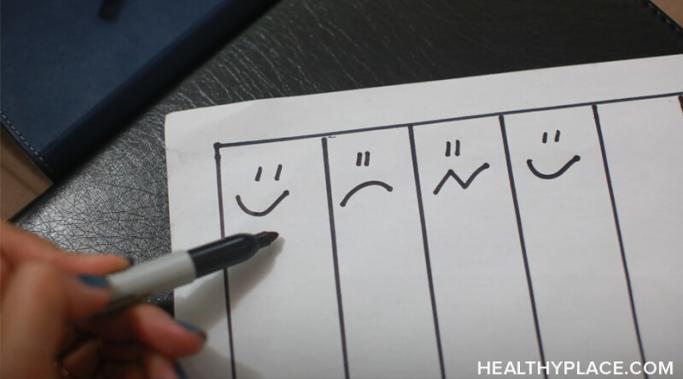I have talked many times about how important a routine is in bipolar disorder (Limitations and Rules that Keep Us Safe). There are many reasons for this, but one of the main ones is because bipolar disorder is considered a circadian rhythm disorder by many medical professionals. Your circadian rhythm is critical to your functioning as a human as it tells your body when to sleep and when to be awake (among other things) and trying to go against it is like swimming upstream. Assuming bipolar disorder is, indeed, a circadian rhythm disorder, we should do everything we can to work to regulate our circadian rhythms in a healthy manner. Keeping a strict bipolar routine is one major way of doing that.
Bipolar Treatment – Breaking Bipolar
In one year I write over 100 blog articles for Breaking Bipolar. I’m honoured to say that many people have responded to this writing and it has spawned many great conversations. Popular topics this year ranged from self-harm to passing down of bipolar to your kids to the understanding of mental illness.
Check out these popular articles you might have missed.
Some time ago, I wrote about generic medications. I explained that generic medications are bioequivalent to brand name medications within a given margin. Generic medications may use binding and other inactive agents that are different from the brand name medication. All of this can lead to a generic being less effective than the brand name drug in a small percentage of cases. Usually though, the generic works just fine for people and the switch is unnoticeable.
And all that information was correct.
But new information has arisen. And it’s alarming information to me. It’s information on exactly how bioequivalence is determined for medication and in the case of one generic medication, the generic of Wellbutrin XL 300 mg, it caused an ineffective drug to be allowed on the market for many years.
You’d let them take an ice pick to your brain if you thought it would help.
Bipolar disorder impacts different people differently. For some people, bipolar disorder is immanently treatable. These people find doctors, therapy and medication and walk off into the sunset with few bipolar symptoms left with which to contend. These people lead the same lives as everyone else and besides (likely) controlling certain lifestyle factor that contribute to stability, they don’t have to think about bipolar disorder on a daily basis.
Then there are the people who are more affected by the illness. These are people for whom treatment partially works. They likely find doctors, therapy and medication too, but in spite of best efforts, they live with bipolar symptoms every day. These people might live your ordinary life or might live a life that is more affected by the illness, such as one where they can only work part-time.
And then there are the people that are severely affected by bipolar. Even with treatment these people tend to have intractable moods and likely can’t work because of them. These people do not live average lives. They live lives dictated by the illness and the treatment. These people are in pain every day.
And it’s only chance that places you in one of those three groups.
As I’ve mentioned, recently I’ve started volunteering for a local bipolar organization and what I do is give presentations to others. One part of the presentation is my “bipolar story.” It’s the story of my life before diagnosis, the process of treatment and whatnot. It’s long and, well, not that happy.
But one of the things that stands out is that treatments have turned me around, but then they stopped working and new treatments had to be found. And these new treatments were extremely hard to find. In fact, successful treatments have been found through guessing as often as through any type of clinical judgement.
And there’s a reason for this: bipolar disorder and bipolar disorder treatment are moving targets and our responses have to move with them.
I wish someone had asked me before naming a class of drugs “antipsychotics.” I mean, I understand that to psychiatrists it might not be a big deal, but to the medication-taking public out here, let me just say that the stigma around medication is about 10-fold when you say you’re on something called an “antipsychotic.”
Tell someone that you’re on “antipsychotics” sometime and watch them back away slowly. I’m not kidding. It’s like they think an axe is about to magically materialize and you’re about to use it to chop off their head.*
It should surprise no one that I consider mental healthcare an essential service for people. Now, I live in Canada and this means that I can get the care I need without paying for it, but people in the United States are not so lucky. I have to constantly hear about people who can’t get the care they need because of the limits placed on them by insurance companies.
And this is wrong.
Mental healthcare is as essential as any other kind of healthcare. If you have a broken leg, you expect treatment, and if you have a broken brain, you should expect the same thing.
One of the problems with psychotherapy (and, keep in mind, I like psychotherapy) is that psychotherapists try to look for a cause for every emotion. And this seems reasonable. Or at least it does, to a person without a mental illness.
I’m a mental health writer and I have a mental illness, so, of course, I write about my mental illness. I write about my symptoms and the affect they have on my life. I write about their treatments and their success or lack thereof. I write about what it’s like to have bipolar disorder.
And boy do people feel fine about judging me for it.
Commonly people will say that I don’t have bipolar disorder (being, I’m sure, expert diagnosticians) or say that I’m an idiot (and whatnot) for trying the treatments I have. It’s gotten so bad, in fact, that some things I don’t like to talk about at all. People like to attack me for electroconvulsive therapy and vagus nerve stimulator use specifically. And I don’t like to talk about self-harm, because inevitably people yell about that.
But I learned something earlier this week – not everyone judges people with a mental illness.
For many years, the psychiatric community has known that therapy plus medication is more effective than either mental illness treatment alone. It all depends on the specific therapy, medication and person, but that’s, generally, the rule.
But the question is, if you’re being a good patient and you’re working your therapy and taking your psychiatric medications as you should, how do you know which one is causing positive results?

![MP910218832[1]](/sites/default/files/styles/blog_listing/public/uploads/2013/01/MP9102188321-1024x684.jpg?itok=DRi_Ifa_)
![MP900337234[1]](/sites/default/files/styles/blog_listing/public/uploads/2012/12/MP9003372341.jpg?itok=sRXYi79a)
![MP900321197[1]](/sites/default/files/styles/blog_listing/public/uploads/2012/12/MP9003211971.jpg?itok=MBDqb95X)
![MP900382658[1]](/sites/default/files/styles/blog_listing/public/uploads/2012/11/MP9003826581-731x1024.jpg?itok=Up3q4iwe)


![MP900385750[1]](/sites/default/files/styles/blog_listing/public/uploads/2012/11/MP9003857501-731x1024.jpg?itok=CsQXXT54)
![MP900289528[1]](/sites/default/files/styles/blog_listing/public/uploads/2012/11/MP9002895281.jpg?itok=g9HZCR-S)
![MP900302920[1]](/sites/default/files/styles/blog_listing/public/uploads/2012/11/MP9003029201.jpg?itok=8NGjkh1h)